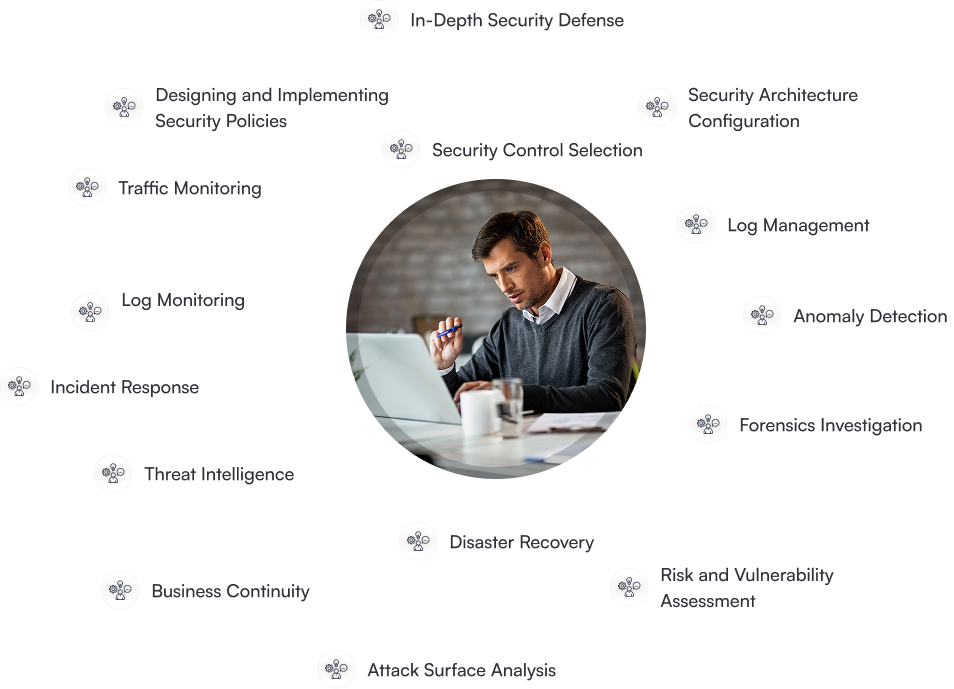MANAGING SECURE NETWORK SYSTEMS
10 Weeks
Duration
Online
Mode of Study
Certified Network Defender (CND)
Certification
$465
Cost Per Credit Hour
Course Overview
This course teaches you to identify, prevent, and mitigate network security threats, making you an important asset to any organization. Establish yourself as an expert with skills in formulating security policies, troubleshooting network disruptions, utilizing various hacking methodologies, developing risk mitigation strategies, and implementing industry best practices to secure data, software, and network systems.
Your career prospects and earning potential will be enhanced by upgrading your know-how of the latest network defense trends, tools, and techniques. You’ll also boost your professional credibility with a valuable cybersecurity certification – CND.


Admission Inquiry
"*" indicates required fields
Highlights of This Course

Cutting-Edge Courseware
10 modules featuring immersive video lectures and digital books for an in-depth understanding of every topic.

Virtual Labs
Simulate real-world scenarios for hands-on practice with the latest cybersecurity tools.

Quizzes
Engaging quizzes after each module that measure and reinforce your knowledge of the topics covered.

Discussions
Interactive discussion boards where you exchange ideas and views on the course topics with your peers and professors.

Essential Tools
Software tools that enhance your learning experience, such as Grammarly.

24x7 Online Library
Round-the-clock online library with an expansive collection of free-to-use learning resources.

Cybersecurity Certification
Includes EC-Council's industry-approved Certified Network Defender (CND) certification.
Why Pursue a Career in Network Defense?
Market Growth
Soaring Demand
Earning Potential
Earning Potential
Weekly Modules
Week-1Module 1 – Hacking Methodologies and Defense Frameworks
This module provides a comprehensive overview of hacking methodologies and frameworks, focusing on the fundamental goals, benefits, challenges, and available countermeasures for defense. You will explore various hacking techniques and corresponding defense strategies, emphasizing the critical need for robust network security.
Week-2Module 2 – Analyzing Security Concerns and Mitigating Risks
This module focuses on analyzing various security concerns within network environments and developing effective strategies to mitigate associated risks. You will delve into technical network security and network perimeter security. The module will cover a range of security threats, including vulnerabilities in network infrastructure, endpoints, and data protection mechanisms.
Week-3Module 3 – Evolution of Security Management in Virtualized IT Environments
This module explores the evolution of security management in virtualized IT environments, focusing on the unique challenges and solutions associated with securing endpoints. The module will trace the development of security practices as IT infrastructures have transitioned to virtualized environments, emphasizing the changing threat landscape and the need for adaptive security measures.
Week-4Module 4 – Implementing Security Management Solutions and Policies
This module provides a practical approach to implementing security management solutions and policies in accordance with industry security guidelines and best practices. You will learn to address the unique security challenges posed by mobile and IoT devices, focusing on the development and application of security policies, the configuration of security management tools, and the enforcement of best practices to protect sensitive data and maintain system integrity.
Week-5Module 5 – Designing Privacy and Security Strategies
This module focuses on designing effective strategies for ensuring the privacy and security of information, software, and network systems. You will explore methodologies for safeguarding sensitive data, securing applications, and protecting network infrastructures. Emphasis will be placed on the principles of administrative application security and data security.
Week-6Module 6 – Security Management in Virtualized and Cloud IT Environments
This module explores the evolution of security management in virtualized and cloud IT environments, emphasizing the implementation of security solutions and policies following industry guidelines and best practices. You will delve into the development of security practices tailored to virtual and cloud infrastructures, examining how these practices have adapted to emerging threats and technologies.
Week-7Module 7 – Implementing Security Solutions and Designing Privacy Strategies
This module provides a detailed approach to implementing security management solutions and policies while designing strategies for the privacy and security of information, software, and network systems. You will learn to develop and apply security measures that align with industry guidelines and best practices, focusing on the unique challenges posed by virtual, cloud, and wireless environments.
Week-8Module 8 – Privacy and Security Strategies in Network Systems
This module focuses on designing effective strategies for the privacy and security of information, software, and network systems while analyzing various security concerns and developing risk mitigation strategies. You will explore advanced techniques in threat monitoring, assessment, and response, with an emphasis on network logs monitoring, incident response, and forensic investigation analysis.
Week-9Module 9 – Security Management and Risk Mitigation Strategies
This module equips students with the skills to implement security management solutions and policies aligned with industry guidelines and best practices, as well as to develop a robust risk management program. You will learn to conduct attack surface analysis and leverage cyber threat intelligence to minimize organizational risks.
Week-10Module 10 – Advanced Risk Management and Threat Mitigation Strategies
This module focuses on analyzing security concerns and developing effective strategies to mitigate risks. You will explore key concepts in threat assessment and prediction, using attack surface analysis and cyber threat intelligence to develop a comprehensive risk management program.
What You Will Learn

- Holistic insights into hacking methodologies and frameworks
- The fundamentals of the goals, benefits, and challenges of network defense
- Defensive countermeasures
- Analysis of various security concerns
- Risk mitigation strategies
- The evolution of security management in virtualized IT environments
- Implementation of security management solutions and policies
- Requisite security guidelines and best practices
- Privacy and security assurance for data, software, and network systems
- Risk management program development
- Attack surface analysis
- Cyber threat intelligence
Virtual Lab Exercises

Get hands-on practice with state-of-the-art cybersecurity tools in simulations that mirror real-world scenarios. The virtual lab exercises included in this course cover network defense disciplines like network attack and defense strategies, network security, endpoint security for multiple operating systems, application security, data security, cloud network security, virtual network security, network traffic and log monitoring, incident response, forensic investigation, and much more.
Skills You Will Gain


- In-Depth Security Defense
- Designing and Implementing Security Policies
- Security Architecture Configuration
- Security Control Selection
- Traffic Monitoring
- Log Management
- Log Monitoring
- Anomaly Detection
- Incident Response
- Forensics Investigation
- Business Continuity
- Disaster Recovery
- Risk and Vulnerability Assessment
- Attack Surface Analysis
- Threat Intelligence
Jobs You Can Prepare For
Cybersecurity Analyst
Security Engineer
Risk Management Specialist
Cloud Security Architect
Privacy Officer
Information Security Manager
Network Security Engineer
Security Operations Center (SOC) Analyst
Compliance Analyst
Security Consultant
Incident Response Manager
Cybersecurity Architect
IT Security Director
Data Protection Officer (DPO)
Vulnerability Analyst
… And Many More!
Total Course Fee
$1,395
- Cost Per Credit Hour: $465
- Technology Fee Per Term: $50
- Transcript Fee: $10 (plus shipping, if international)

Admission Criteria
- You must be aged 18 years or older.
- You must have a high school diploma (or equivalent), college degree, or relevant certification.
How to Apply
Step 01 :
Fill out the NDS application form and submit it to our Enrollment Advisor.
Step 02 :
Send us a scanned copy of your official government identification and documents showing proof of education.
Step 03 :
Pay the one-time $100 application fee.
Voices of Success: Hear from Our Alumni
Here’s what our students say about this course and how it helped advance their cybersecurity careers.

Frequently Asked Questions
What is the CND certification?
Certified Network Defender (CND) is a cyber security certification offered as a part of EC-Council University’s Managing Secure Network Systems non-degree course. At its core, CND is designed to validate your skills in protecting, detecting, predicting, and responding to IT network security threats.
How much does it cost to get CND certified?
EC-Council University’s Managing Secure Network Systems non-degree course covers three (3) credit hours at a fee of $465 per credit hour ($1,395 total fee). This course allows you to earn the Certified Network Defender (CND) certification.
What is the CND certification useful for?
Cyber security professionals who want to build their network security skills and defend their organization’s network infrastructure find the Certified Network Defender (CND) certification very useful because:
- The CND certification teaches the skills to protect, detect, respond to, and predict network security threats.
- It provides training on monitoring network traffic, analyzing logs, and identifying potential security incidents.
- It includes hands-on lab exercises to give you practical experience using the latest cyber security tools in real-world scenarios.
- The CND certification is vendor-neutral, providing an unbiased approach to learning secure networking practices.
- The certification covers several important cyber security topics, including network defense, network traffic analysis, log management, secure IDS, VPN and firewall configuration, vulnerability scanning, and more.
